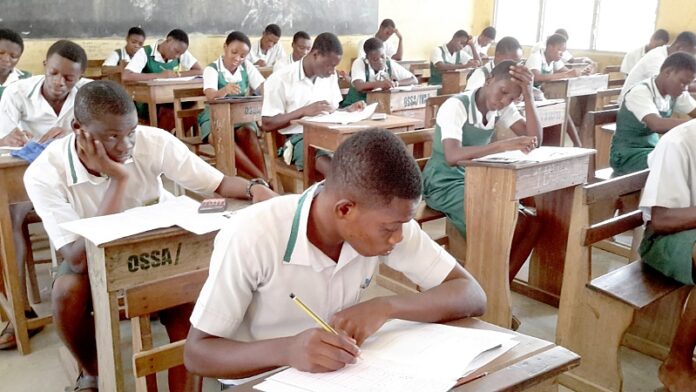Taofeeq Ajibade
Most secondary schools in Nigeria were only a couple of days to the beginning of their second term examination for the 2019/2020 academic session when the federal government declared a national health emergency and locked down the whole country. Even the schools that had begun as at the time had only written a few papers. What then started like a few weeks’ precautionary step eventually ran for six (6) consecutive months.
Secondary school students eventually lost the examination week of the second term, a full (3rd) term, and a few more weeks in the first term of a new session (2020/2021) due to the #EndSARS protest and the nationwide destruction that trailed it. While the coronavirus ravaged the world, the consequent multifaceted national and individual losses for many citizens can only be imagined. The rest, they say, is history.
At about the same time, the university teachers embarked on indefinite strike action over an unfulfilled agreement the federal government had with their union, Academic Staff Union of University (ASUU) way back in 2009. That too sent university students back home. They were to remain at home for the next nine straight months – that is an equivalence of time to finish a Master’s degree in some universities.
The ASUU/FG feud was only resolved in the last week of December 2020. As the celebrated resumption coincides with the Yuletide, effective resumption was expected in the first week of January until the Federal government ordered all schools to close down until January 18, 2021, for it to observe the spread of COVID-19 and decide what it would do next. This was the same pattern the first lockdown extended over a six-month period as the government continued to extend the period until well into September 2020.
With the now widely-known reality about COVID-19, locking up schools on the pretext of a COVID-19 pandemic is, in my opinion, rather counterintuitive. The largest gathering of people – educated and uneducated – is not found in a hall or a school; it is found in the market. Not even the largest political rally can match the size of a city market. So, if markets can open, without any visible prevention protocols, and yet with only a few or no incidents of spread, it is not out of place to suggest that schools can safely open, especially with all the prevention protocols that are already in all schools and which can even be upgraded as the Health Ministry may instruct.
There is no arguing the fact that schools are more organized than markets. It is also much easier to explain the dangers and prevention of any diseases/viruses to students and subsequently gain their understanding and cooperation than it is with the largely less educated folks in the marketplaces. Even where students seem uncooperative, they can be whipped into line without much ado.
We have already been informed that this coronavirus will be around for a long period of time. It is also a fact that medical researchers and pharmaceutical companies have since been working tirelessly to find effective drugs for viral infection. Pfizer/BioNtech and AstraZeneca-Oxford have already produced and got their respective vaccines approved for mass production and distribution.
Given this fact, there is no point to further paralyze the academic system which was probably the greatest loser in the year 2020. Schools – arguably the most adaptable to change – cannot be held as the most vulnerable and therefore locked up purportedly to contain the spread of a disease which, according to experts, would not go anytime soon. This is especially instructive considering the fact that the vast majority of students in this country still receive their education through a face-to-face medium. Our school system still relies much on the brick and mortar classroom. Even the higher institutions are yet to move close to the real digital classroom. What passes for digital integration in our schools is mere online registration for courses, school fee payment, and the download of some texts. The core of teaching and learning is still fully face-to-face. The only exception is a few private schools – secondary and tertiary. I am not aware of any public schools that have substantially moved their lesson delivery, assignments, and grading online using the latest Learning Management System (LMS).
In view of this reality, rather than locking up schools indefinitely, the relevant Ministries should enforce strict compliance with the COVID-19 protocols and deal singly with erring schools. It is therefore my hope that January 18, 2021, the tentative resumption date fixed by the federal government for schools across the country will not be extended on the excuse of the second wave of COVID-19. Schools (obvious students) across all levels have suffered enough and should not be subjected to further hindrance or agony because of a virus whose total cases since February 2020 is still much less than the cases of malaria. Just imagine the number of people who may have died of malaria or other preventable or treatable diseases (since last February) due to their inability to afford the right drugs or, regrettably, the unavailability of the right equipment or medics in our hospitals.
It is the responsibility of the government to make our health system truly functional and accessible in a manner that significantly reduces mortality from minor and preventable diseases.
God bless Nigeria!
Taofeek Ajibade is an education researcher and public affairs analyst. Trained at the International Centre for Educational Evaluation, University of Ibadan, his interests include Digital Classroom, Teacher Competence, Learning improvement, and emotional intelligence. He’s also a member of the Muslim Writers’ Guild of Nigeria (MASQ-NG).
Email: taofeeqajibade@gmail.com
Twitter: @taofeeekajibade












